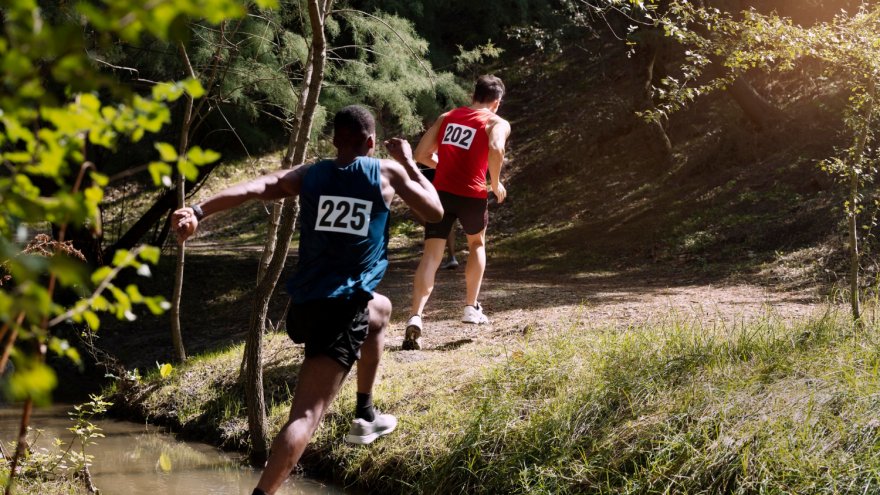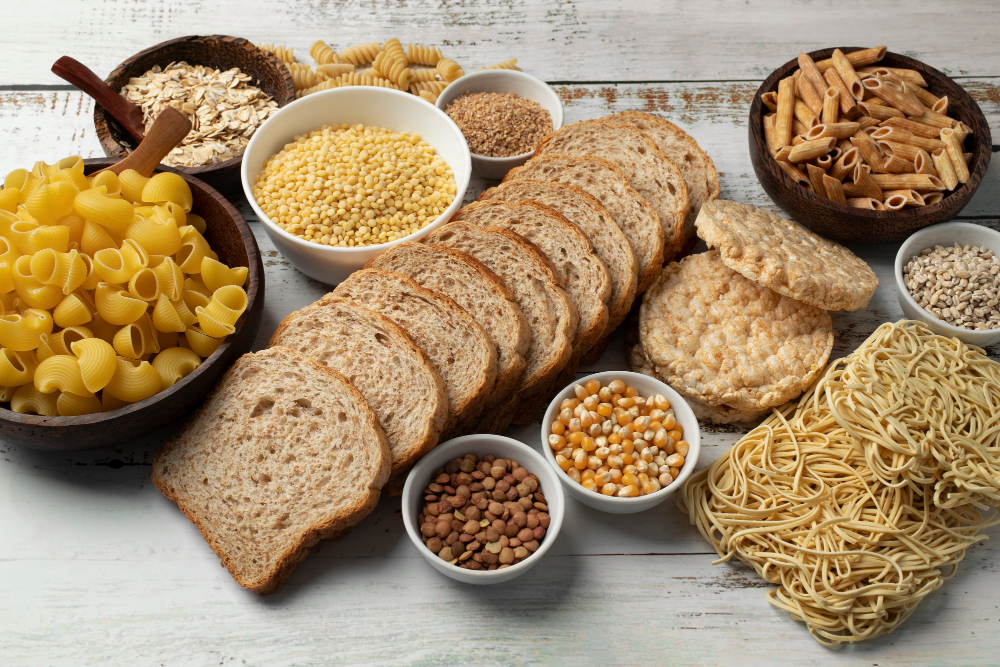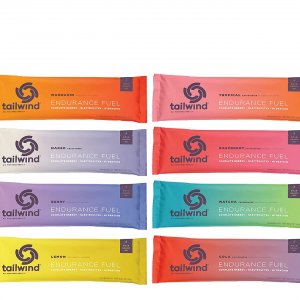Nutrition and Hydration Tips for Trail Running

As far as running nutrition goes, it is crucial to consume 30-60 grams of carbohydrates per hour during long runs to optimize energy levels and enhance recovery. As for proper hydration, a good rule of thumb is to aim for at least 16-20 ounces of water 2-3 hours before the run and an additional 8-10 ounces 10-20 minutes before the run. Aim to take in 16-20 ounces of hydration per hour during your run.
Whether you are an experienced trail runner or a beginner, having your nutrition and hydration routine before, during, and after your runs are essential.
Being adequately hydrated and fueled for your trail runs is the best way to get the most out of your workout and stay healthy so you can enjoy a plethora of adventures.
Let’s talk about the ins and outs of nutrition and hydration tips for trail runners.
The Importance of Nutrition and Hydration in Trail Running
Nutrition and hydration are really important when it comes to trail running performance and overall health. Unlike road running, trail running can place greater demands on the body due to varying terrain, weather conditions, and elevation changes.
If you do it right, you can optimize your energy levels, endurance, and recovery.
Dehydration can lead to fatigue, cramping, and impaired cognitive function, all of which can negatively impact performance. No one wants to be tired, hurting, and out of it out on the trails.
Hydrating correctly before, during, and after training runs and races can help maintain optimal fluid balance and prevent dehydration.
And, of course, you do not want to forget nutrition! Properly fueling your body and intaking in enough calories is vital for trail runners.
When you do a long run, your body burns through glycogen stores. These are basically little stores of energy your body has used carbohydrates to create. When you burn through these, it can lead to fatigue and reduced performance if not replenished. This often happens to under-fueled runners during longer runs, even low-intensity ones.
Proper fueling can help you maintain energy levels and prevent bonking. Yes, bonking! This is a state of sudden fatigue caused by depleted glycogen stores; it commonly happens mid-run.
Nutrition and hydration are also something you need to think about for post-run recovery.
Refueling with the right nutrients can help repair muscle tissue, reduce inflammation, and replenish glycogen stores. Proper hydration can also help prevent muscle cramps and improve recovery time.
Pre-Run Nutrition
Pre-run meals are important for providing the body with the necessary nutrients and energy to sustain physical activity. The type and timing of pre-run meals can significantly impact performance, endurance, and overall comfort during the run.
Eating something before you run provides your body with the necessary carbohydrates, proteins, and fats to sustain physical activity. Carbohydrates are especially important for providing energy, as they are stored in the muscles and liver as glycogen, which the body can tap into during exercise.

Eating a pre-run meal can help prevent hunger during the run, which can lead to a drop in energy levels and overall discomfort.
While incorporating some healthy fats like peanut butter into your pre-run meal is a great idea, you want to avoid eating a heavy or fatty meal before a run because this can lead to gastrointestinal distress such as cramping, bloating, or nausea.
Eating a lighter, more easily digestible meal before a run can help reduce the risk of gastrointestinal distress.
It is a great idea to experiment with different types of food and the timing of meals to find what works best for your body.
Generally, eating a meal 2-3 hours before a run is recommended to allow time for digestion.
The meal should be high in complex carbohydrates, moderate in protein, and low in fat and fiber.
Pre-Run Nutrition Meals for Trail Runners
When deciding on a pre-run meal, consider what sits well with you, the timing of the meal, and the nutritional makeup.
Endurance sports dieticians such as Kylie Vanhorn with Fly Nutrition suggests aiming for a meal consisting of simple carbs, 10-12 grams of protein, and a small amount of healthy fat.
Some examples of meals with the preferred balance of macros, as mentioned above, include:
- Oatmeal with banana and nut butter
- Kodiak cakes with maple syrup and nut butter
- Avocado toast with cottage cheese and everything bagel seasoning
- Yogurt with fruit and granola
- Ham and egg breakfast sandwich
- Two eggs with toast and avocado
- Bagel with nut butter
- Smoothie with yogurt, oats, and fruit
- Overnight oats
- Rice with milk, cinnamon, and nut butter

Nutrition During a Trail Run
Be sure to consume carbohydrates during a trail run to help maintain energy levels and delay fatigue. Good sources of carbohydrates include energy gels, bars, dried fruits, and sports drinks.
If you are running long-distance events, then eating small and frequent meals during a trail run can help maintain energy levels and prevent stomach discomfort. In events like ultramarathons, they typically have aid stations where you can eat small meals and snacks, so take advantage of them.
Nutrition in trail running is not a one size fits all. What works for one person may not work for another, so finding the right nutrition strategy that works for you is important.
Always be sure to plan ahead and pack enough food and hydration for the duration of your trail run. It is better to have too much food and hydration than not enough.
Remember to listen to your body and adjust your nutrition strategy accordingly. If you feel hungry or low on energy, consume carbohydrates to maintain energy levels. If you feel thirsty or lightheaded, take a break and drink some water.
Proper nutrition during a trail run can help you perform at your best and achieve your trail running goals.
Hydrating Before Hitting the Trails
Keeping your body at the right temperature during exercise is really important, especially during trail running. Staying properly hydrated helps your body better regulate temperature. This is key on trails where the terrain can be challenging, and the weather conditions can vary.
Dehydration can lead to serious health problems such as heat exhaustion, heat stroke, and even death. Staying hydrated before hitting the trails can prevent dehydration and ensure your safety during the run.
When you keep your body well hydrated, you are also helping to lubricate joints, muscles, and connective tissues, which can reduce the risk of injury during the run.
Have you ever felt just totally sick and awful after a long trail run?
Practicing proper hydration aids in removing waste products and toxins from your body, which can speed up recovery and reduce muscle soreness after the run. If you fail to do this, you may feel sick or sore for longer.
Hydration Tips for Trail Running
How Much Should You Hydrate?
The amount of hydration needed varies based on factors such as temperature, humidity, and individual sweat rates.
A good rule of thumb is to aim for at least 16-20 ounces of water 2-3 hours before the run and an additional 8-10 ounces 10-20 minutes before the run. Aim to take in 16-20 ounces of hydration per hour during your run, likely more on hotter days.
The Importance of Electrolytes in Hydration
Drinking plain water is great, but sports drinks contain electrolytes which help your body actually to make use of the fluid you take in.
So try adding some type of electrolyte mix to your water before and during your trail runs. Many great electrolyte mixes are on the market, such as Skratch Hydration and Tailwind.


Electrolytes are sodium, potassium, calcium, and magnesium minerals that help regulate the body’s fluid balance, nerve and muscle function, and blood pH levels. These seemingly simple things play a crucial role in hydration.
Tips for Carrying and Accessing Water While on the Trail
Here are some tips for carrying and accessing water on the trail:
- Use a Hydration Pack: A hydration pack is a backpack designed to carry water and usually comes with a bladder that can hold 1-3 liters of water. In addition, it has a hose and mouthpiece that allows for easy and convenient access to water while on the move.
- Handheld Water Bottle: Handheld water bottles are designed to be carried while running and are usually equipped with a strap or a handle. They come in various sizes, from 12-24 ounces, and can be easily refilled at water sources on the trail.
- Waist Belt Water Bottle: Waist belt water bottles are a convenient way to carry water without having to carry a backpack. They usually come with one or two water bottles and can be worn around the waist.
- Plan Your Route: Plan your route so that you know where water sources are located on the trail. This will allow you to refill your water bottles or hydration pack and reduce the amount of water you need to carry.
- Practice Carrying Water: It is a good idea to practice carrying water before hitting the trail, especially if you are not used to carrying a hydration pack or water bottles. This will help you get used to the weight and make necessary adjustments to your gear.
The Takeaways
As you hit the trails, remember that nutrition and hydration play a critical role in fueling your body for peak performance. Whether you’re a seasoned trail runner or just starting out, finding the right nutrition strategy for your body is key to achieving your trail running goals.
Experiment with different types of pre-run meals, fueling during your run, and hydration methods to find what works best for you.
Don’t forget to pack plenty of water and snacks for your adventure on the trails. With the right nutrition and hydration strategy, you can conquer any trail and reach new heights in your trail running journey!
Latest Articles
 Is Running on a Treadmill Easier Than Running Outside?Runners have their own preferences, whether it is treadmill running, running outside on the road, or exploring trails. So...
Is Running on a Treadmill Easier Than Running Outside?Runners have their own preferences, whether it is treadmill running, running outside on the road, or exploring trails. So... Is It OK to Use Trail Running Shoes on the Road?While trail running shoes can be used on roads, especially in situations where a runner encounters mixed terrains or pref...
Is It OK to Use Trail Running Shoes on the Road?While trail running shoes can be used on roads, especially in situations where a runner encounters mixed terrains or pref... How to Fix Sore Quads After Running?Rest, ice, gentle stretching, and over-the-counter pain relievers can help soothe sore quads after running. Also, ensure ...
How to Fix Sore Quads After Running?Rest, ice, gentle stretching, and over-the-counter pain relievers can help soothe sore quads after running. Also, ensure ... 10 Fruits With The Most Electrolytes to Replace Sports DrinksThese fruits are high in electrolytes such as potassium, magnesium, and calcium, essential for hydration, muscle function...
10 Fruits With The Most Electrolytes to Replace Sports DrinksThese fruits are high in electrolytes such as potassium, magnesium, and calcium, essential for hydration, muscle function...

